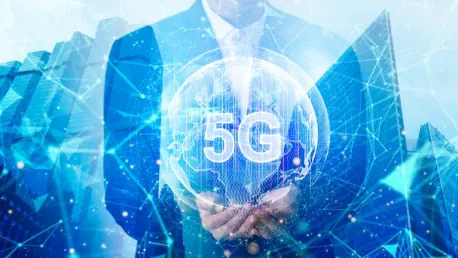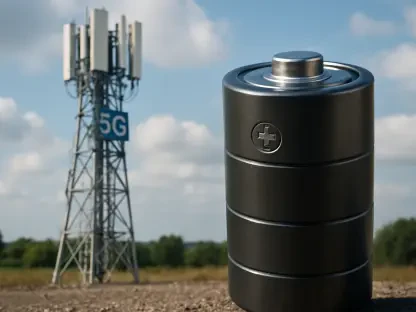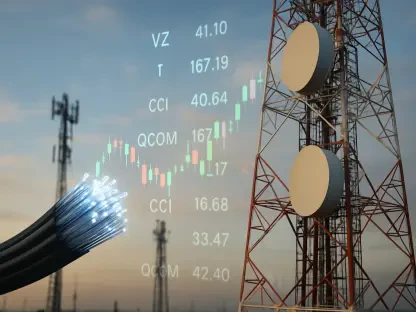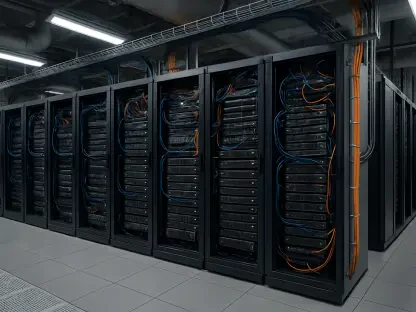The retail industry in the United States is undergoing a significant transformation, driven by the widespread adoption of 5G technology. Since its emergence in the late 2010s, 5G has evolved from a secondary technology to a vital component enhancing communications and operational efficiencies across diverse retail environments. Retailers are increasingly recognizing the potential of 5G to revolutionize their operations, from the back-end logistics to the front-end customer experience, positioning themselves for future growth and competitiveness in a fast-evolving digital landscape.
The Rising Adoption of 5G in Retail
A central theme in the retail sector is the accelerated adoption of 5G technology. More than 60% of American retailers plan to embrace 5G within the next two years, reflecting a substantial shift towards this advanced networking solution. This trend is primarily driven by the impressive returns on investment reported by early adopters. Retailers who have already integrated 5G into their operations report notable improvements in financial performance. On average, these retailers experience an 8.3% increase in sales and a 21% higher profit growth, underlining the transformative potential of 5G technology.
Driving this rapid adoption is the need for robust and reliable connectivity that can handle the increasing volume of data generated by retail operations. With the growing reliance on online platforms, customer analytics, and automated systems, retailers are turning to 5G to meet their demand for high-speed, low-latency networking solutions. Enhanced customer interaction, improved inventory management, and streamlined supply chains are some of the immediate benefits being realized by those adopting this technology. As more retailers leverage 5G, it is clear that this technology is a game-changer in driving efficiency and profitability.
Enhancing Network Architecture
One of the most significant advantages of 5G in retail is the enhancement of network architecture. By combining public and private 5G networks with cloud-managed wireless edge solutions, retailers can create robust and modern networking infrastructures. These advanced network solutions provide enhanced security, traffic optimization, and reliability, enabling seamless operations across various touchpoints, from warehouses to storefronts. The integration of public and private networks allows retailers to optimize their operations by ensuring uninterrupted service, whether in densely populated urban centers or remote rural locations.
Building a resilient network architecture is crucial for handling the diverse and dynamic requirements of retail operations. For instance, 5G enables real-time data processing and analytics, which are essential for inventory management, improving supply chain logistics, and personalizing customer experiences. Modernizing network architecture with 5G also means that retailers can support emerging technologies like augmented reality (AR) and virtual reality (VR) applications in their stores, enhancing the overall shopping experience. Moreover, deploying edge computing solutions further decentralizes computing power, boosting efficiency by processing data closer to its source.
Delivering Unmatched Reliability
5G technology offers unmatched reliability in retail operations, rivaling that of traditional wired connections. Cellular connections, particularly 5G, are invaluable in overcoming the limitations of wired networks, especially in challenging environments like construction zones or during natural disasters. This reliability extends to failover scenarios, where 5G serves as an effective backup connection. Research indicates that 5G can reduce network downtime by up to 60%, ensuring consistent operational continuity, which is crucial for maintaining customer trust and satisfaction.
In addition to providing a dependable backup, 5G networks enhance day-to-day operations by supporting multiple devices and applications simultaneously without significant latency or bandwidth issues. Retailers can rely on 5G to keep their Point of Sale (PoS) systems, inventory management tools, and customer service applications running smoothly, even during peak shopping periods. This reliability leads to faster transaction times, minimal disruptions, and a better overall customer experience. Moreover, the ability of 5G to seamlessly integrate with other network technologies ensures that retailers can build a cohesive and resilient network infrastructure that adapts to their evolving needs.
Fortifying Security Systems
Security remains a critical concern for retailers, especially regarding point-of-sale (PoS) systems and IoT devices. The zero trust security model, emphasized in 5G applications, helps isolate devices and protect networks by cloaking IP addresses and enforcing strict access policies. By integrating 5G WWAN infrastructure into their security strategies, retailers can achieve enhanced protection against potential breaches, thus safeguarding sensitive customer and operational data. Implementing zero trust involves robust authentication processes and continuous monitoring to ensure that only authorized users have access to critical systems.
Beyond traditional security measures, 5G offers advanced encryption methods and secure communication channels that further protect data transmission across the network. This is particularly important as the number of connected IoT devices in retail environments continues to grow. From smart shelves to automated check-out kiosks, each device presents a potential entry point for cyber threats. Leveraging 5G’s security capabilities ensures that these devices are securely integrated into the network, minimizing vulnerabilities and protecting against data leaks or cyberattacks. As cyber threats evolve, retailers can remain proactive by regularly updating security protocols and adapting to new 5G-enabled security advancements.
Improving Flexibility in Operations
The flexibility enabled by 5G is transforming how retailers deploy and manage their network devices. Cloud-managed wireless edge solutions supporting LTE and 5G-enabled devices facilitate rapid network deployments, often in just a day, compared to the months-long setup required for wired networks. AI-powered cloud management tools further streamline network adjustments, reducing the workload on IT staff and allowing retailers to adapt swiftly to changing demands. This increased flexibility enables retailers to respond quickly to market trends, seasonal demands, and new technological advancements.
Rapid deployment and easy scalability of 5G networks mean that retailers can expand their operations without the lengthy delays associated with traditional infrastructure projects. Whether opening new stores, setting up pop-up locations, or launching mobile retail units, 5G provides the connectivity needed to get things up and running quickly. Additionally, the flexibility offered by 5G allows retailers to experiment with new concepts and services without committing significant resources upfront. This agile approach to network management supports innovation and helps retailers stay competitive in a rapidly changing market.
Facilitating Scalability
Scalability is another critical benefit of 5G in retail. As retailers expand their operations, they need networks that can support increasing numbers of mobile and IoT devices. 5G offers the extensive reach and reliability necessary to maintain communication in areas where traditional connectivity might falter. With 5G and cloud-managed solutions, retailers can methodically scale their operations without overwhelming their IT resources, maintaining efficient and secure network performance. This scalability is essential for supporting large-scale data analytics, real-time inventory tracking, and personalized customer interactions.
Expanding operations often involve integrating new technologies and processes that can strain existing network infrastructure. 5G alleviates this strain by providing high-speed, low-latency connections that can handle increased data loads effortlessly. Retailers can confidently introduce new digital services, such as mobile apps, loyalty programs, and AR experiences, knowing that their network can support these initiatives. Furthermore, the ability to scale quickly and efficiently enables retailers to capture new market opportunities and respond to customer needs promptly, fostering growth and enhancing competitiveness.
Revolutionizing Warehouse Logistics
Private 5G networks are proving crucial in revolutionizing warehouse logistics. These networks support the use of automation, robotics, and other advanced technologies, enabling more efficient asset tracking and enhanced safety measures. The speed and reliability of 5G networks also facilitate real-time data exchange, which is essential for the smooth operation of modern logistics systems. By leveraging private 5G networks, warehouses can operate with heightened precision, reducing errors and improving overall productivity.
Warehouse automation powered by 5G includes automated guided vehicles (AGVs), drones, and AI-driven sorting systems that streamline the handling and movement of goods. 5G enables these technologies to communicate and coordinate seamlessly, optimizing workflows and minimizing downtime. Enhanced asset tracking ensures that inventory levels are accurately monitored and managed, reducing the risk of stockouts or overstock situations. Additionally, 5G-supported safety measures, such as real-time monitoring of hazardous areas, contribute to a safer working environment for employees, reducing incidents and improving operational efficiency.
Elevating Customer Experience
The retail industry in the United States is experiencing a major transformation, propelled by the widespread adoption of 5G technology. Since its emergence in the late 2010s, 5G has transitioned from a secondary technology to an essential component that enhances both communication and operational efficiency across varied retail settings. Retailers are increasingly cognizant of the transformative potential of 5G, which promises to revolutionize their operations. From optimizing back-end logistics to enhancing the front-end customer experience, 5G positions retailers for future growth and competitiveness in a rapidly evolving digital marketplace. By leveraging the capabilities of 5G, retailers can improve inventory management, streamline supply chains, and offer more personalized customer service, thus ensuring they stay ahead in a highly competitive environment. As the retail landscape continues to evolve with technological advancements, the role of 5G will only become more pivotal in driving innovation and efficiency.









